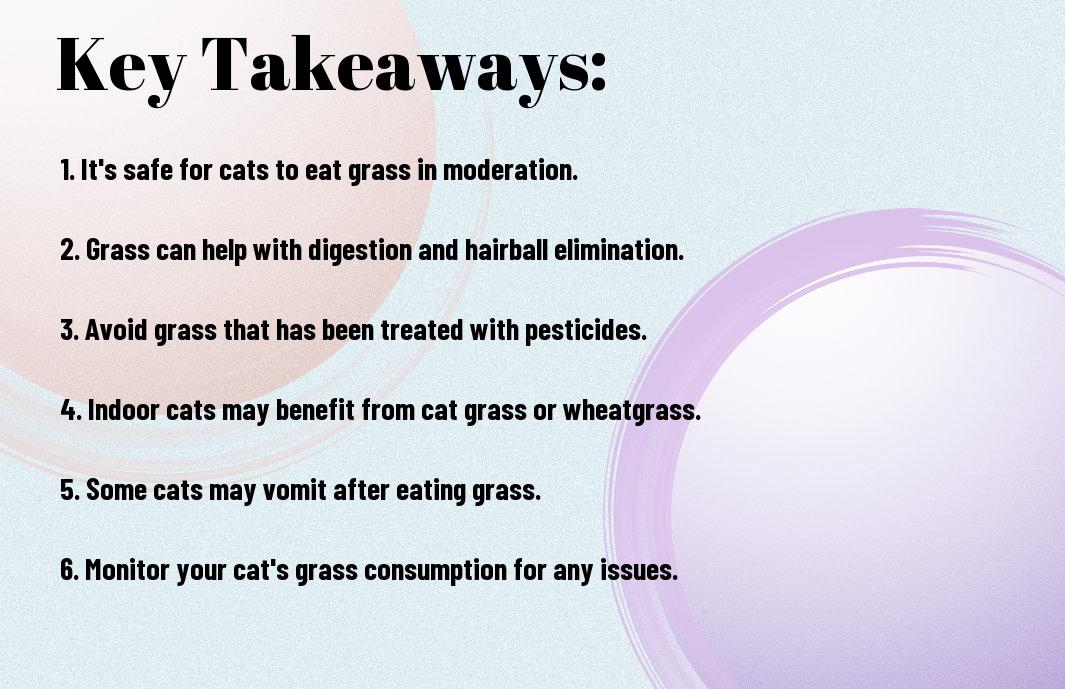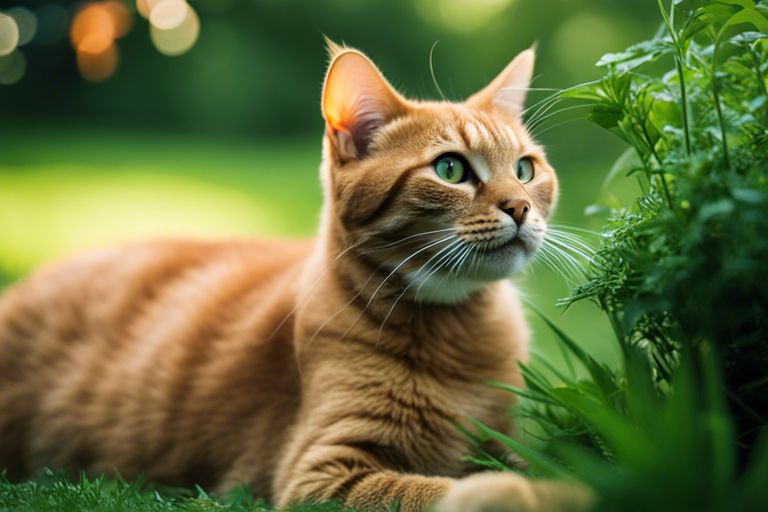Curious feline behavior often leaves pet owners wondering about the safety of certain foods. One common question is whether cats can eat grass and if it poses any dangers to their health. It’s a well-known fact that cats are obligate carnivores, but they also have a tendency to nibble on greenery, leading to the question of whether this behavior is beneficial or harmful. In this blog post, we will explore the reasons behind this behavior, the potential benefits and dangers of grass consumption for cats, and whether it’s safe for your furry friend to indulge in this natural behavior.

Understanding Feline Behavior
Some cat owners may wonder why their feline friends have a tendency to nibble on grass. Why Do Cats Eat Grass? This behavior is actually quite common and can be explained by understanding feline instincts and dietary habits.
Natural Instincts and Dietary Habits
Dietary habits play a significant role in a cat’s life. In the wild, cats are natural hunters and their diet consists mainly of meat. However, they also consume small amounts of vegetation through the stomachs of their prey. This helps in digestion and also provides some essential nutrients.
Furthermore, grass can act as a natural laxative, helping cats to expel hairballs and other indigestible material from their digestive tracts.
Benefits of Grass to Cats
Dietary supplementation with grass can also provide cats with essential vitamins and minerals that may not be present in their regular diet. Additionally, the act of chewing on grass can have a calming effect on cats, making it an important form of enrichment for indoor pets. This behavior can also serve as a way for cats to alleviate boredom, reduce stress, and fulfill their natural urge to chew.
Behavior, feline instincts, dietary habits, essential nutrients, calming effect

Health Implications
One of the common questions among cat owners is whether it is safe for their feline companions to eat grass. While grass consumption can have potential benefits for cats, it also comes with certain risks and safety concerns that should be taken into consideration.
Potential Benefits of Grass
An interesting aspect of cat behavior is their inclination to nibble on grass. This behavior is believed to have potential benefits for cats, including aiding in digestion and helping to eliminate hairballs. Grass can also provide essential nutrients such as folic acid, which is beneficial for overall feline health.
Furthermore, some experts believe that eating grass may help cats to induce vomiting when they have ingested something that is causing them discomfort, acting as a natural form of self-medication.
Risks and Safety Concerns
On the other hand, there are risks and safety concerns associated with cats consuming grass. Some grass and plants may be toxic to cats, leading to potential health issues. Additionally, outdoor grass may have been treated with pesticides or herbicides, which can be harmful if ingested by your cat.
While grass can help with digestion, excessive consumption may lead to vomiting or diarrhea, which can be uncomfortable and potentially harmful for your cat.
Benefits of grass consumption for cats should be weighed against the potential risks and safety concerns. It is important for cat owners to be mindful of the type of grass their cat has access to, and to ensure that it is safe for consumption. Consult with your veterinarian for guidance on providing safe grass options for your feline companion.
How to Safely Introduce Grass to Your Cat’s Diet
Despite the many benefits of grass for cats, it’s important to introduce it to their diet carefully. Rapid or excessive consumption of grass can lead to vomiting and other digestive issues in cats. By following the right steps, you can ensure that your feline friend enjoys the benefits of grass without any adverse effects.
Suitable Types of Grass for Cats
When considering adding grass to your cat’s diet, it’s essential to choose varieties that are safe for them to consume. Wheatgrass and oat grass are both suitable options, as they are non-toxic and easy to grow indoors. Alternatively, consider purchasing cat grass from a pet store, which is specifically cultivated for feline consumption. After selecting the right grass, ensure it is free from pesticides and other harmful chemicals.
| Wheatgrass | Oat grass |
| Non-toxic and safe for cats to consume | Another safe option for feline consumption |
| Easy to grow indoors | Can be grown indoors |
| Free from pesticides and harmful chemicals | Sold specifically for feline consumption |
Importantly, make sure the grass is free from any small, sharp objects that could harm your cat’s digestive system and supervise their initial interactions with it to prevent any mishaps.
Introducing Grass Responsibly
Grass can provide numerous benefits for cats, but it should be introduced into their diet responsibly. Gradually introduce grass to your cat by offering small amounts initially, such as a few blades of cat grass in a dedicated area. This will allow them to adjust to the new addition without overindulging. Monitor your cat’s behavior and any changes in their digestive patterns after consuming grass.
Cats are obligate carnivores, meaning their primary source of nutrition comes from animal protein. While grass can offer digestive and nutritional benefits, it should not replace a balanced diet tailored to their specific dietary requirements.

Is It Safe for Cats to Eat a Variety of Human Foods?
While cats eating cashews safety is a concern, it’s generally safe for them to eat a variety of human foods in moderation. It’s essential to avoid toxic foods like chocolate, onions, and grapes. Some human foods, like cooked chicken or fish, can be a healthy occasional treat for cats.
Can Cats Eat Grass? Is It Safe For My Cats?
Following this discussion, it is clear that cats can indeed eat grass and it can actually be beneficial for their digestion and overall well-being. While some cats may not be interested in grass, for those who are, it can provide essential nutrients and help with hairball maintenance. However, it is crucial to ensure that the grass is safe for consumption, free from pesticides or toxic chemicals. It is recommended to grow cat grass specifically for your feline companion or to purchase it from a trusted source. Always monitor your cat’s behavior and consult a veterinarian if you have any concerns about their grass consumption. By being informed and proactive, you can safely incorporate grass into your cat’s diet and provide them with a natural source of enrichment and nutrition.
FAQ
Can cats eat grass? Is it safe for my cats?
Yes, cats can eat grass and it is generally safe for them. In fact, many cats enjoy munching on grass as it can aid in digestion and provide important nutrients. However, it is important to ensure that the grass they are consuming is free from pesticides and other harmful chemicals.
Why do cats eat grass?
Cats may eat grass as a natural way to aid in the digestion process. The grass can help to induce vomiting, which can help clear their system of any indigestible material such as fur or bones. Additionally, some believe that grass consumption may provide certain nutrients that are missing from their regular diet.
What type of grass is safe for my cats to eat?
It is safest for cats to eat cat grass, which can be found at pet stores and is specifically grown for pets to consume. Avoid grass that has been treated with pesticides or chemicals, as this can be harmful to your cat. If you allow your cat to roam outdoors, be cautious of what types of grass they are consuming to ensure it is safe for them.

Hello there, I am Iftekhar Ahmed. I am the owner of Mishka & The Cat Corners. I love to explore and write on various topics about cats

